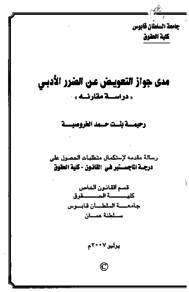Document
مدى جواز التعويض عن الضرر الأدبي :|b"دراسة مقارنة"
Publisher
جامعة السلطان قابوس
Gregorian
2007
Language
Arabic
English abstract
The purpose of this study is to examine the possibility of the compensation for the literary damage in the Comparative Legal System and in the Omani Legal System by answering the following inquiries:
The Islamic Law attitude to the doctrine of the Literary Damage. The contemporary legal scholars towards the doctrine of the Literary Damage. The Omani Old Doctrine attitude to this principle, and the extent of harmony between the Omani Lawmaker and the Judicial practices with the Omani Old Doctrine.
In order to answer these inquiries, the researcher has conducted some studies on the clash point between the Islamic Old Doctrine which supports the principle of the Literary Damage, and the contemporary scholars who disagree with this principle.
As a result of this research, it has been revealed that the Islamic Law realized the authenticity of the Literary Damage since the early stage of Islam and that is why it was a must to compensate it. It has been proved so by religious evidences from the Holy Book, Hadith, the Companions of the Prophet, and the statements of some of the old scholars, particularly the Old Omani Doctrine which compensated the Literary Damage in its all forms.
The most important results this study has reached:
the debate of the possibility of the Literary Damage Compensation has emerged during the time of the contemporary Law jurists immediately after they divided the damage into two types: materialistic and literary. The problem of the literary damage compensation has become worse when the scholars adopted Imam Al-Ghazaly definition of liability. The Old Omani Doctrine supports the literary damage. It is clear from studying the draft law of civil transactions that the Omani Legislation refrained from approving the principle of compensating literary damage. After examining the judicial practices in courts, it became clear that they swing between a supporter and a objector to the principle of literary damage.
Member of
Resource URL
Arabic abstract
تهدف هذه الرسالة إلى الوقوف على مدى جواز التعويض عن الضرر الأدبي في النظام القانوني المقارن والنظام القانوني العماني ، وذلك من خلال الإجابة عن التساؤلات الآتية :
* موقف الشريعة الإسلامية من مبدأ تعويض الضرر الأدبي ؟
* موقف الفقهاء المعاصرين من مبدأ تعويض الضرر الأدبي ؟
* موقف الفقه العماني القديم من هذا المبدأ ؟ ومدی اتفاق موقف المشرع العماني والممارسات القضائية مع الفقه العماني القديم ؟
وللإجابة على هذه الأسئلة قامت الباحثة بالبحث عن موطن الخلاف بين الفقه الإسلامي القديم المؤيد لمبدأ تعويض الضرر الأدبي والفقهاء المعاصرين المعارضين لمبدأ التعويض عن هذا الضرر .
وتبين من خلال هذه الدراسة أن الشريعة الإسلامية أدركت حقيقة الضرر الأدبي منذ بداية الإسلام فأوجبت تعويضه، وأثبتنا ذلك بالأدلة الشرعية من الكتاب والسنة وآثار الصحابة وأقوال بعض الفقهاء القدامى وعلى الأخص الفقه العماني القديم الذي عوض الضرر الأدبي بجميع مظاهره وذلك استنادا لقوله صلى الله عليه وسلم "لا ضرر ولا ضرار" .
ومن أبرز النتائج التي توصلت إليها الدراسة : لم يثر الشك حول جواز تعويض الضرر الأدبي في عصر الرسالة المحمدية .
ظهر الخلاف حول مدى جواز تعويض الضرر الأدبي في عصر فقهاء القانون المعاصرين إثر قيامهم بتصنيف الضرر إلى نوعين مادي وآخر أدبي . تفاقم مشكلة تعويض الضرر الأدبي عند تبني الفقهاء تعريف الإمام الغزالي للضمان كمعيار للأضرار التي يجب تعويضها . يعد الفقه العماني القديم من مؤيدي تعويض الضرر الأدبي . يتضح من خلال استقراء مشروع قانون المعاملات المدنية أن المشرع العماني قد أحجم عن تبني مبدأ تعويض الضرر الأدبي . وبالإطلاع على الممارسات القضائية في أروقة المحاكم باختلاف درجاتها يتضح أنها تتأرجح بين مؤيدا لمبدأ تعويض الضرر الأدبي وأخر معارضة له ولا شك أن الضحية في ذلك هو المضرور .
* موقف الشريعة الإسلامية من مبدأ تعويض الضرر الأدبي ؟
* موقف الفقهاء المعاصرين من مبدأ تعويض الضرر الأدبي ؟
* موقف الفقه العماني القديم من هذا المبدأ ؟ ومدی اتفاق موقف المشرع العماني والممارسات القضائية مع الفقه العماني القديم ؟
وللإجابة على هذه الأسئلة قامت الباحثة بالبحث عن موطن الخلاف بين الفقه الإسلامي القديم المؤيد لمبدأ تعويض الضرر الأدبي والفقهاء المعاصرين المعارضين لمبدأ التعويض عن هذا الضرر .
وتبين من خلال هذه الدراسة أن الشريعة الإسلامية أدركت حقيقة الضرر الأدبي منذ بداية الإسلام فأوجبت تعويضه، وأثبتنا ذلك بالأدلة الشرعية من الكتاب والسنة وآثار الصحابة وأقوال بعض الفقهاء القدامى وعلى الأخص الفقه العماني القديم الذي عوض الضرر الأدبي بجميع مظاهره وذلك استنادا لقوله صلى الله عليه وسلم "لا ضرر ولا ضرار" .
ومن أبرز النتائج التي توصلت إليها الدراسة : لم يثر الشك حول جواز تعويض الضرر الأدبي في عصر الرسالة المحمدية .
ظهر الخلاف حول مدى جواز تعويض الضرر الأدبي في عصر فقهاء القانون المعاصرين إثر قيامهم بتصنيف الضرر إلى نوعين مادي وآخر أدبي . تفاقم مشكلة تعويض الضرر الأدبي عند تبني الفقهاء تعريف الإمام الغزالي للضمان كمعيار للأضرار التي يجب تعويضها . يعد الفقه العماني القديم من مؤيدي تعويض الضرر الأدبي . يتضح من خلال استقراء مشروع قانون المعاملات المدنية أن المشرع العماني قد أحجم عن تبني مبدأ تعويض الضرر الأدبي . وبالإطلاع على الممارسات القضائية في أروقة المحاكم باختلاف درجاتها يتضح أنها تتأرجح بين مؤيدا لمبدأ تعويض الضرر الأدبي وأخر معارضة له ولا شك أن الضحية في ذلك هو المضرور .
Category
Theses and Dissertations

